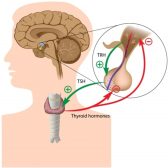Definition
noun, plural: peptides
A compound consisting of amino acids connected by an amide bond
Supplement
Peptides are comprised of monomers of amino acids that are linked in chain via an amide bond. The bond is formed between the carboxyl group of one amino acid and the amine group of another. A peptide comprised of two amino acids is called dipeptide. A peptide that has three amino acids is called a tripeptide; if it has four, tetrapeptide, and so forth.
Peptides can be classified according to function. Examples of peptide groups based on their function include hormones, neuropeptides, and alkaloids. They can also be classified according to how they are produced. Ribosomal peptides are produced through mRNA translation whereas nonribosomal peptides (e.g. glutathione) are those produced by enzymes specific to each peptide rather than by a ribosome. Peptones are peptides that are not as common as the ribosomal and nonribosomal peptides. They are produced from the proteolysis of animal milk or meat.
Word origin: Ancient Greek peptós (digested)
See also:
- antibiotics peptide
- atrial natriuretic peptide
- bradykinin-potentiating peptide
- calcitonin gene-related peptide
- connecting peptide
- dipeptide
- gastrin-releasing peptide
- homodetic peptide
- islet amyloid peptide
- leader peptide
- lipopeptide
- monomer
- mucopeptide
- neuropeptide
- octapeptide
- pentapeptide
- peptide bond
- peptide hormone
- peptidoglycan
- protein
- receptors vasoactive intestinal peptide
- related peptide
- signal peptide
- transit peptide
- tripeptide
- vasoactive intestinal peptide






